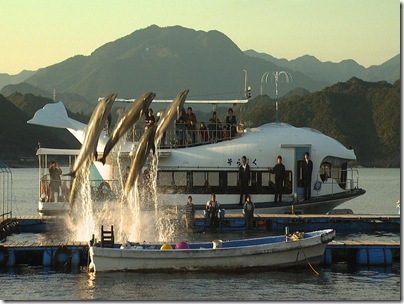 If Man on Wire brought the mechanics of a suspense thriller to the structure of a documentary, The Cove goes one step further: Marrying Michael Moore activism to that film’s docu-thriller aesthetic.
If Man on Wire brought the mechanics of a suspense thriller to the structure of a documentary, The Cove goes one step further: Marrying Michael Moore activism to that film’s docu-thriller aesthetic.Just as the suspense in Man on Wire hinged on wire walker Philippe Petit’s attempts to not get caught in an elaborate scheme to walk a wire between the Twin Towers, The Cove’s ambitious protagonist Ric O’Barry stealthily breaches forbidden land time and again, disguising cameras in rocks and blimps and sneaking past barriers in the pitch-black darkness when he isn’t outwitting flustered authority figures. But where Petit’s goal was self-serving, O’Barry’s is selfless and vital – to stop the mass slaughter of dolphins and whales that takes place each fall in Taiji, Japan.
The opening frames of The Cove tease us with the allure of illegality. They show a scene depicting O’Barry, in a car with members of the Oceanic Preservation Society (which produced the film), being pursued by Japanese law enforcement. Director Louie Psihoyos then hits the brakes, providing the context leading up to the chase. We find that for O’Barry, a former dolphin trainer for Flipper turned anti-captivity activist, the threat of arrest is a common occupational hazard. He rather takes pride in it, having been arrested numerous times in his native Miami for attempting to rescue dolphins from captivity.
The Cove follows his latest, and riskiest, attempt yet to expose sea mammal cruelty. Though it’s a largely unknown event – even in parochial Japan – in September of each year, countless whales and dolphins are slaughtered in a Taiji cove. In this whaling holocaust, the “good” dolphins are sold to places like Sea World and other amusement centers as show animals, while the rest are mutilated and packaged as food.
Exposing the deep-seated political undercurrents that lie beneath the shocking tableaux of blood-red waters, O’Barry and his team of saltwater muckrakers offer a scathing indictment of corruption that goes well beyond animal cruelty. They reveal the health risks involved when mercury-poisoned dolphin meat is dispersed in markets throughout Japan, often in deceptive packaging. You don’t have to be an animal activist to be outraged; whether or not you care that dolphins are being butchered like cattle, you have to concede that the spread of dolphin meat in Japanese groceries – some was even required on school lunch menus – is fatally wrong.
When O’Barry claims that the media and the Japanese government are involved in a massive cover-up of the slaughter, it sounds conspiratorial. But as the diligent filmmakers continue to lay out their case, it becomes perfectly plausible. The Japanese have tried repeatedly to repeal a 1986 ban on whaling that was instated by the International Whaling Commission. According to the film’s findings, Japanese bureaucrats bribed small Caribbean nations into joining their pleas for a repeal by simply throwing money at their struggling economies.
For every excuse Japanese officials provide for the slaughter (it’s a matter of pest control, they claim, to save the dwindling fish population that’s devoured by the dolphins), the filmmakers proceed to debunk it, and by the end, they’ve composed a piece of eye-popping agitprop that rubs the fishermen’s horrific actions in their noses and has the potential to rid the world of this tragedy.
Unsettling, informative, fast-moving, never boring and even occasionally funny, The Cove is the work of a passionate few using their resources to bring about change for countless dolphins who, like humans, are self-aware mammals whose perpetual smiles do little to suggest the pain and suffering they’re subjected to.
Surely, no dolphin activist has been told “You can’t be here” more than Ric O’Barry. Here’s hoping he continues to tread in dangerous waters.
John Thomason is a freelance writer based in South Florida.
THE COVE. Distributor: Lionsgate; Director: Louis Psihoyos; Rated: PG-13; Opens: Friday; Venue: Regal Shadowood 16 in Boca Raton, Regal Delray Beach 18 in Delray Beach and Cobb Downtown in Palm Beach Gardens.